The wait has finally come to an end. The nominations have come in, the voting's over. Just fifty are left standing. For the past two months The Exchange has scoured the length the breadth of the globe in search of the most influential men and women in spread betting, forex and CFDs; the people who have sculpted the industry into the beast it is today, and the people who will determine where it is going in the future. With no specific criteria and no exclusions, the nominations were countless and varied. Many were put forward, but only a few have survived. It's been a tough road, but the survivors have truly earned the right to call themselves the industry's elite. So without further ado, we present the TOP 49.

Drew Niv has been instrumental in the success of two online foreign exchange firms. Prior to co-founding FXCM, he served as Director of Marketing for MG Financial Group. His efforts were pivotal in transforming an unknown company with less than 250 clients into one of the early industry leaders with over 1000 clients in less than 18 months. Niv's accomplishments at MG Financial Group include building the firm's Sales Department, creating the most popular website for currency trading news, and establishing a network of introducing brokers for the firm. In 1999 he left MG Financial to start FXCM. At FXCM he is primarily responsible for creating and coordinating marketing initiatives, strategic alliances, and personnel decisions. Niv graduated from the University of Massachusetts in 1995.
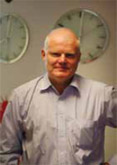
Michael Derks is the Chief Strategist at FxPro and has quickly established himself as one of the most respected and sought after comentators on events shaping global forex markets. He is regularly quoted in the key international financial publications and often appears as guest host on CNBC and Sky News. Michael joined FxPro in May 2010 having been previously at Deutsche Bank, Rothschild and Schroders. He is a multi-discipline investment and market strategist/ economist with extensive expertise in forex, strategic and tactical asset allocation, fixed income, equities, property and alternative assets. Michael is a proud Aussie sports fan, who is as well known for his love of rugby, football and cricket. With more than 29 years experience in the industry he holds a Bachelor of Economics degree from Macquarie University in Sydney.

Co-founder of Capital Spreads, Simon joined London Capital Group in March 2003. He has extensive experience of building and running derivatives businesses and in the practical application of derivative pricing and risk models. Simon was COO at LCG from 2005 until 2008 when he was appointed CFO. In 2010 he accepted the position of CEO. London Capital Group specialises in online trading services for retail and professional customers, offering financial spread betting and CFDs, institutional forex and institutional broking. The group has recently made its first steps into international expansion, with Simon overseeing the successful launch of Capital CFDs in Australia. Simon is a widely respected commentator in his field and often appears on CNBC or as a speaker at events.

Michael Hewson is the chief market analyst at CMC markets. Having spent six years as a trader Hewson has been using his industry experience to deliver technical analysis education to CMC clients and further afield for the last 15 years. Able to resonate with traders from all backgrounds and levels of experience, his audiences ranges from experienced traders to private investors, corporate and retail, and academics. Hewson is also a regular public speaker, and has delivered seminars on the subject of Trading and Technical Analysis at the World Money Show, London Business School and London Stock Exchange.

Phil Adler's financial markets career spans three decades.After working for a firm of stockbrokers on the LIFFE floor,Phil went on to join IG Index in 1987 before moving to set up the CFD desk at GNI. Phil returned to IG Group in 2009 to run the UK CFD business, IG Markets.

As President of the European Central bank, Jean Claude Trichet is highly influential over Euro mentary policy and FX markets, making him one of the most powerful men in the world.

George Tchetvertakov joined Alpari (UK) in 2008, bringing a natural ability to analyse market information as well as significant experience in the financial markets to the company. His main responsibility now involves producing insightful market commentary on Foreign Exchange markets for various Alpari clients. Shortly after graduating with Honours in Economics from City University/CASS Business School, George began his career by trading FX, commodities and equities. In 2005 he was recruited by Refco from a group of 15,000 applicants for a position on their graduate recruit program. After successfully graduating he became a backed financial futures trader for Refco.Since then George has concentrated on analysing market movements,evaluating market risks and working closely with clients to provide a highly professional service to help them attain an edge in the financial markets.

James Hughes joined Alpari (UK) at the beginning of 2011, taking responsibility for further expanding Alpari (UK)'s media presence and the company's involvement in conferences and web-based events, with a focus on foreign exchange and CFDs education. James is a wellknown market commentator and appears regularly in the financial media, including interviews on the BBC, Sky News, CNBC and Bloomberg television. He works with the most reputable media organisations in the trading industry and shares Alpari (UK)'s insights in Forex, CFDs and precious metals with journalists on a daily basis.James previously worked at CMC Markets for over nine years, most recently as a Market Analyst.

Andrey Vedikhin has played a leading role in the history of Alpari, beginning with originally co-founding the Alpari Group of companies in 1998. His company vision and entrepreneurial spirit has taken Alpari from concept to a rapidly growing, highly competitive and profitable company in the online Forex industry. As CEO of Alpari (UK), Vedikhin is currently responsible for new business development and strategic initiatives for the whole Alpari Group.He developed his expertise in cross-markets and Forex trading from a young age. In 1995, aged 20 and still studying, he immersed himself in the Russian financial markets.After graduating with a distinction from the Finance and Economics unit of Kazan State University, Russia in 1997, he went on to complete an additional PhD in Economics and focused solely on Forex trading. He is registered with the FSA and holds several industry qualifications. He also co-authored Forex: an inside view,with fellow Alpari Group colleague Gleb Petrov, and has authored several other technological publications.

Boris Schlossberg began his Wall Street trading career more than 20 years ago at Drexel Burhnam Lambert. There, he traded nearly every type of financial product on the market in the U.S., from equities and options to stock index futures and foreign exchange. His innate ability to analyse market information and use it to trade has helped him become an industry-recognised, go to trading professional. Schlossberg is a weekly contributor to CNBC's Squawk Box and a regular commentator for Bloomberg radio and television. His daily currency research is widely quoted by Reuters, Dow Jones and Agence France Presse newswires and appears in numerous newspapers worldwide. Schlossberg has written for publications such as SFO magazine, Active Trader and Technical Analysis of Stocks and Commodities. He is also the author of Technical Analysis of the Currency Market and the co-author of Millionaire Traders: How Everyday People Are Beating Wall Street at Its Own Game with Kathy Lien. He joined GFT in 2008.

Joshua Raymond is Chief Market Strategist and Global Head of PR at City Index. Joshua is one of most widely recognised market commentators in the broadcast and print media. He is one of the youngest associate directors at City Index, being fast tracked through the ranks, and working directly with the company's board of directors.Having graduated from Durham University, Joshua joined IFX markets in 2005 in a sales trader role. His understanding of the markets saw him begin appearing on CNBC Europe regularly as a commentator and analyst within six months, an undertaking he continues to fulfil today. Joshua contributes regularly to networks such as CNBC Europe, Bloomberg, BBC News and Sky News, as well as mainstream international print media,including Financial Times and Wall Street Journal. Following City Index's acquisition of IFX Markets in 2006, Joshua became Head of UK Retail Sales and oversaw sales performance hit record levels on a consistent basis. Josh then moved to the marketing department, where he was tasked with redeveloping City Index's client education programme.In unison with restructuring City Index's seminar programme and introducing a wide library of educational webinars, Josh developed and launched City Wise, the industry's first dedicated social media portal for spread bettors and CFD traders.

Sandy Jadeja is the Chief Technical Analyst for City Index. He has been involved with the financial markets for over 23 years and is a respected and widely recognised analyst and trainer in technical analysis. Sandy has had his commentary featured in prominent media outlets as The Financial Times,The Telegraph, Barron's, The Australian Financial Journal, Dow Jones News, Reuters and The BBC.Sandy is a weekly guest analyst on CNBC's Closing-Bell, and provides an exclusive educational course on Technical Analysis for CNBC Europe's Strictly Money programme. He also features on Cantos TV where he provides weekly education updates on Trading Strategies. Having established a reputation as an articulate presenter and trading mentor on the subjects of trading strategies and psychology, Sandy attracts large crowds of traders and investors to both national and international conferences and world expos.He has participated in and hosted professional panels relating to trading and investing. He was also elected exclusively from the UK in 2005 to speak on technical analysis for the GCC Economic Forum in Dubai. Sandy offers his trading insights, strategies, and provides unique educational workshops, focusing on safer trading, risk control, and money management as part of City Index's education program.

Barney Frank may not be the recognisable name on the list of the 50 most influential people in spread betting, but don't be fooled into thinking a lack of familiarity lessens the impact, or potential impact, Frank has in the industry. The progressive Democrat's name is currently most often associated in the States with the legalisation of online gambling, and in particular internet poker, since the passing of H.R 4777 in 2006. In 2007 Frank put his name to the Bill setting out to legalise online gambling in the U.S, and if successful this will be seen as a key turning point in the potential legalisation of spread betting in the United States as well.

In an industry where volatility creates volume, few people have been more of an influential figure in spread betting over the past six months than Muammar Gaddafi. The Libyan dictator's actions since a public uprising in the nation he purports to rule have sent markets, in particular commodities, into a spiral, with at least a proportion of the spring surge in oil prices attributable to activities in the North African country. Might not be in consideration for this list this time next year.
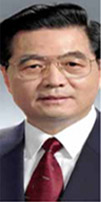
As the head of the fastest growing economy in the world, Hu Jintao represents the increasing degree of power the internal economic actions of China have over global finances, in particular the prices of commodities and the resultant impact on costs for businesses across the world. In addition to this influence over stocks, a free floating of the Yuan (China's currency) will not only add a number of major currency pairs to the FX markets, but could also have a further enormous impact on commodity prices due to China's reliance on imports.

For years William Von Meuffling has been well known on Wall Street as one of the most successful investors, and then hedge fund managers in the industry. However, it's Von Meuffling's latest speculation, an £80m investment in IG Group, that now makes him a truly influential figure in the UK spread betting market. One of the most well respected and influential men in the world of longonly stock purchasing, Von Meffling's backing has the very real potential to propel IG Group into the FTSE 100 for the first time.

As the Chairman and a founding shareholder of FxPro Denis Sukhotin has been instrumental in the global forex broker's remarkable success story. Launched in Cyprus in 2006,FxPro now has over 23,000 clients in more than 149 countries with monthly trading volumes in excess of $100 billion. Denis has overseen all of the company's marketing and promotional activities which have included sponsorship of F1 Racing teams. He is an avid football fan, perhaps one reason why FxPro has been the main shirt sponsor of Aston Villa FC and AS Monaco FC, as well as currently being the main shirt sponsor of Fulham FC and also sponsors of the Asian Football Confederation Champions League and WRC. Denis holds a Masters Degree in Finance and Economics from the Moscow Institute of Entrepreneurship and Law, and prior to launching FxPro had a highly successful career in equity sales.

An Honours Graduate from Oxford University, Nick Beecroft brings over 25 years of international trading experience to the financial industry. Prior to his appointment at Saxo Bank, Nick spent five years at Standard Chartered Bank serving,inter alia, as Global Head of Foreign Exchange, and was a member of the Bank of England's Foreign Exchange Joint Standing Committee. Previously, Nick spent eight years at Deutsche Bank, where he was promoted from Head of FX Sales and Trading in London to Global Head of Spot and Proprietary FX Trading. Nick began his long career in FX as a Graduate Trainee at Citibank in 1981, rising to become Head of FX Trading in London and,subsequently, UK Treasurer.Away from Saxo Bank Nick is one of the most insightful market commentators in the industry. His articles are widely published, and always well received by fellow professionals and traders alike. One of the most respected opinions in the industry.

You have to do something pretty special to posthumously be named as one of the most influential people in the world of trading, so perhaps that's why only one man has achieved that feat. Not only is Jesse Livermore, the Great Bear of Wall Street, considered by most people to be the greatest natural trader of all time, but he is thought to have also written Reminisces of a Stock Operator, still considered the most influential book ever written about trading.
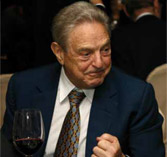
A major force in the world of FX trading for almost forty years, George Soros still manages one of the world's largest hedge funds, the Quantum Fund. Despite amassing billions of dollars of profit for both himself and his investors Soros is best known for shorting the British pound to the tune of $10bn on Black Wednesday, forcing the British government to withdraw from the European Exchange Rate Mechanism and netting over a billion dollars' worth of profit in the process.

Tim joined IG Group as a graduate in 2000 and has spent eleven years in the industry, becoming head of sales trading in 2005 and Managing Director of IG Index the spread betting division of the company and largest of its kind in the UK in 2010. Tim was instrumental in the delivery of the IG Index iPhone application, which was recognised as being 'indispensable' in a recent Sunday Times survey.

Head of the FSA, the quasijudicial body responsible for the regulation of the financial services industry in the UK.
Highly influential in decisions involving levels of OPEC oil supply to the market, which in turn has a direct impact on oil prices.
Financial analyst, technical analysis pioneer and author. Developed Bollinger bands technical analysis tools and wrote Bollinger on Bollinger Bands, one of the most influential technical trading books ever written.
U.S hedge fund manager who predicted the collapse of the Sub Prime mortgage market and consequently made billions of dollars trading credit default swaps. Still manages one of the largest hedge funds on Wall Street.Subject of the book The Greatest Trade ever.
Author of The Black Swan, voted one of the twelve most influential books written since WW2, Nassim Taleb was one of the few men who predicted the financial crash of 2008. Currently lecturing at the Polytechnical Institute of New York and Oxford University, Taleb has also been a hedge fund manager and Wall street trader.
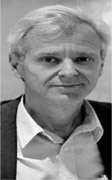
Michael Stumm is the cofounder of OANDA. He has a Ph.D. in computer science and is a computer engineering professor at the University of Toronto. Michael specializes in distributed and parallel systems, internet technology, and e-commerce, and has contributed his expertise in positions at IBM, Stanford University, the University of Toronto, and the ETH in Zurich. He served as chief technology officer of SOMA Networks (another company he cofounded) from 1999-2003, and served on SOMA's board of directors from 2002-2003. Michael has authored more than 100 scientific articles in leading peerreviewed journals and has five published U.S. patents.
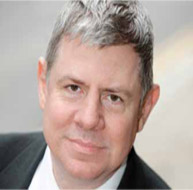
Clem Chambers is CEO of ADVFN, Europe and South America's leading financial forum website. A broadcast and print media regular, Clem Chambers is a familiar face and frequent co-presenter on CNBC and CNBC Europe. He is a seasoned guest and market commentator on BBC News 24, Newsnight, BBC 1, CNN, SKY News, TF1, Canada's Business News Network and numerous US radio stations.
Head if the CFTC, an independent agency of the U.S government responsible for regulating the futures and options markets. Appointed by Barack Obama in 2009. Jurisdiction over $5tn of trades.
Author of the highly successful Wizard trading book series, including Market Wizards, New Market Wizards and Stock Market Wizards.
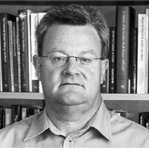
Author of The Financial Spread Betting Handbook, one of the widest read and most often referenced texts on how to succeed in the spread betting industry. An excellent book with a technical, systematic approach to the art of trading.

Head of the UK Government, upon whose decisions foreign exchange and stock markets will react.
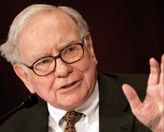
Legendary investor Warren Buffet is perhaps the greatest living trader of all time. Despite having amassed a personal fortune of $50bn through trading on Wall Street and the acquisition of interest in companies Buffet still remains active in the markets, primarily through conglomerate holding company Berkshire Hathaway, of which he is the CEO. He was ranked as the third richest person in the world by Forbes magazine in 2011.

David Jones was formerly a currency strategist then a journalist with Shares magazine. He moved into the industry in 2005 before joining IG Group in 2007. David is a highly respected market commentator, regularly appearing on national TV and in the press. He is also the author of the bestselling book Spread Betting the Forex Markets.
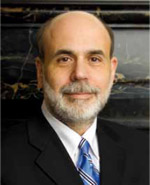
As the man charged with looking after the world's biggest bank, Ben Bernanke's influence over FX and financial markets all over the globe holds no bounds.A man not without his critics, Bernanke was at the helm before, during and after the U.S Sub-Prime mortgage market collapse and the folding of Lehman Brothers, the two biggest contributors to the financial crisis of 2008. His lack of foresight has been highlighted by some analysts as playing a crucial role in the current state of global economics. Either way, the actions of the U.S central bank still play a huge role in the day to day movements of the central markets.

In an industry where market volatility is the is key to profit and loss it's not surprising that the most powerful man in the world holds a degree of influence over the markets. In fact there isn't a decision Obama makes that doesn't affect global finances in one way or another, so any trader looking to make money from trading would do well to try and place himself into the mind of the President of the United States. Throw into the mix the fact that a decision by the U.S Government to legalise spreading betting would dramatically alter the landscape of the industry even in the UK and it's easy to see why Obama is regarded as being one of the most influential men in an industry it appears he wants nothing to do with.
Western authority and pioneer of Candlestick charting analysis in trading.
The Co-founder of City Index and inventor of sports spread betting, Jonathan Sparke, may have taken a step back from the front line of the spread betting industry, but the legacy he left behind still resonates through trading platforms today.
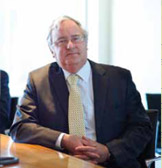
Tim Howkins joined IG Group as Finance Director in 1999, and became Chief Executive in 2006. Under his leadership the Group is now a FTSE 250 member and currently operates in 14 countries worldwide. During Tim's time as CEO, group revenue has grown from £89m to £320m. Tim is on the Board and Executive Committee of the Futures and Options Association, an industry association for the UK and European derivatives industry. He has a first in mathematics and computer science, is a chartered accountant and a member of the chartered institute of taxation.

Peter Hetherington was an officer in the Royal Navy before joining IG Index as a graduate trainee in 1994,and has remained with the company ever since,playing a large role in its climb to the top the spread betting industry. He has a degree in economics from Nottingham University and a Masters in Finance from London Business School. Initially working as a dealer,he was promoted to Dealing Director in 1999 then appointed as COO on the main board in 2002. As COO Peter ran IT, in 2007 this became a more operational traditional COO role and in 2011 changed again with Peter now looking after all the revenue generating business units at IG Group globally.
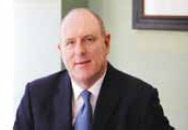
In 1989 Peter Cruddas established Currency Management Consultants Ltd with nothing more than £10,000 of capital and a wealth of experience of foreign exchange trading.
Now known as CMC Markets Plc, the company today has an estimated worth of £1.25 billion. Goldman Sachs paid £140m for a 10% stake in in CMC in 2007. Profits rose sharply to £57.2m in 2007-08 on soaring turnover of £181.4m. Past salaries, dividends and a £30m property portfolio once valued Cruddas at over £1bn.
Stock market turmoil last October led to a record day for client activity at CMC Markets, hitting the company hard and reducing Cruddas' personal stake from £1.12 billion to £850m.
As well as establishing an empire in the world of spread betting, Cruddas is also known for his charitable work. Having built an extremely successful business, three years ago he established The Peter Cruddas Foundation with the primary objective of helping disadvantaged and disengaged youth.
To date, in excess of £11 million the foundation has granted or pledged to more than 50 charities - it is Cruddas' hope that total donations will exceed £100 million”. Cruddas is also the current treasurer of the Tory party.

Martin Belsham is one of the most well-known names in City spread betting circles, and a veteran of a number of online betting firms.He joined City Index in January 2009 from Rank Group, where he was Managing Director of the interactive gaming business, and to whom he sold his Blue Square bookie for £65m in 2003. This is Belsham's second time at the helm of City Index, having served as CEO from 1998-2002.
He founded Blue Square in 1999, which was originally controlled by the private business interests of Michael Spencer. Prior to his time with Blue Square and Rank he held a number of positions within the banking and brokerage industry.
On his appointment as CEO in January 2009, Belsham instigated a period of reorganisation and refocusing which returned City Index to profitability and secured the base for future growth.
He has brought in a new, highly experienced and talented management team to City Index and overseen the implementation of better and more innovative risk management tools, including the Margin Close Out policy, which limits potential client losses to the amount they hold in their accounts. He has also overseen City Index's transition to the forefront of technological innovation, highlighted by the launch of the industry's first Apple-approved, live trading app for the iPhone.
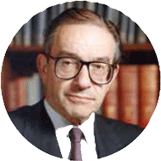
Since taking over as the Head of the world's most influential bank in 1987 Alan Greenspan has held one of the most powerful opinions in global financial policy. Despite stepping down from his position at the Federal Reserve in 2006 Greenspan is heavily respected in US economics to this today and, still a figure who attracts the media spotlight whenever he speaks out about economic policy, Greenspan's outspoken views both backing and criticising the U.S Government still hold enough weight to shift global FX and index markets.

As the man charged with keeping the UK central bank on the straight and narrow, there aren't that many more influential men in the financial world, let alone the United Kingdom, than the Governor of the Bank of England, Mervyn King.As chairman of the monetary policy committee King presides over the men who determine UK interest rates,and consequently the knock-on effects a change of rates have on the UK finances in particular the foreign exchange and index markets.Under King's guidance interest rates have remained at their lowest under the independent monetary policy committee since dropping to 0.5% in March 2009, and with analysts now predicting that poor economic data will result in this remaining stationary until 2013, a weak British pound looks set shape UK economics for months, if not years, to come.

How did you get into the trading industry?
I was studying econometrics and finance in Holland and had a professor who asked me to do some work for him over the summer. I said that I would, but that if I was going to give up my summer perhaps he could arrange some work experience for me afterwards. He agreed and I did the work experience at an insurance company,I was there for a couple of months and at the end they asked me to stay.
How long have you been in the industry now?
Since 1992, so almost twenty years now.
How would you describe what your role in the industry is? Are you more than purely a trader?
My day job, and my night job for that matter, is trading. I manage a hedge fund,so although I also run the Lex Van Dam Trading Academy and do a lot of education seminars, my primary profession is pure trading.
Do you have any personal highlights of your time in the industry?
Making the television programme (Million Dollar Trader, which ran on BBC 2 in 2009) was definitely a highlight. Coming up with the idea and developing it was a great process to be a part of. A lot of people have ideas but actually making it happen is something different, so to get Million Dollar Trader off the ground was really pleasing. Writing a book was also a highlight, it took a lot of discipline to finish it. My book How to Make Money Trading has just gone to a second print, I've sold over 10,000 copies to date, so it's nice to have run out of a first edition.
You're perhaps best known for pioneering spread betting on television, do you think there's a future for trading in mainstream visual media?
I think there definitely is. Any media on spread betting should be all about education and teaching people to trade responsibly, and hopefully that is what I have done and can have a role with in the future. There's no point in people opening a spread betting account, putting in some money and quickly losing it all, the only way to solve this problem is proper education and training. I'm carrying the baton for this way of thinking by running the Lex Van Dam Online Trading Academy, which is being positively received. We tell people how they should go about trading,that it's not gambling, and that they should be really careful. And the platforms want people to come back and keeptrading over and over again so it's in their interests that account holders continue to make money as well.
What impact do you think the television programme you made and similar shows in the future have on the number of spread betting account holders?
I think people are still quiet short term when they think about trading. I think the industry itself wants to change, but this is easier said than done, especially at the moment because the general economic situation isn't so strong, meaning people won't have the same quantities of available capital for trading anymore. In the long term its certainly in people's interests to take control of their own finances instead of giving their money to someone else, which is why we're trying to teach them how to best manage it themselves.
To you think that increased television coverage could lead to an explosion in the number of people actively spread betting much like it did with poker a number of years ago?
I think if the industry takes the right approach and thinks in a long term view about how to educate people properly then the industry has huge potential to grow. If people begin to see it as an alternative to poker then I think the market will be limited.

What were you doing before you started working in the spread betting industry?
My professional background is private practice law, I practiced in Australia specialising in financial services regulation and corporate advisory. When I moved to London I initially worked for Deutsche Bank, and then spread betting came across my radar.I didn't know a lot about it at the time, but made the move to IG six years ago and I can't imagine not being in the industry now.
What is your current position at IG?
I am the Global Head of Legal and Compliance, and also the company secretary of IG Group.
What does that involve on a day to day basis?
IG Group has got thirteen offices around the globe, it's my responsibility to ensure that those offices comply with the rules and regulations that apply to them and also to make sure that IG provides its clients with a service that's fair in compliance with the regulations. The legal aspects of my role primarily involves protecting IGs legal rights and making sure we fulfil our legal obligations when dealing with anybody other than IG,including clients, employees and suppliers.
What is the role of the Spread Betting Association in the industry?
The Spread Betting Association has been around for more than ten years, it's an association of all the major spread betting providers in the UK. We have a lot of common interests as an industry with a small number of major market players, and we're currently in a period of a lot of regulatory changes. Therefore I think that the SBA is an important body that is a gives the firms an opportunity to get together and air their views on where the regulations are going, and also common issues such as how we should be protecting customers and making sure that the industry retains its good reputation.
How do you split your time between the work you do at IG and the SBA?
The majority of my time is spent working for IG, but there's inevitably an amount of flexibility in how involved I am with the SBA. Depending on the issues affecting the industry at the time e.g. new regulation proposals, I might be liaising with other firms more often than I would normally.
How involved are you with regulatory bodies? Do they ever consult you?
Yes, we do represent the industry and consult with regulatory bodies as part of the fair regulatory process. The regulatory bodies give affected parties the chance to comment on proposals, so very often if the FSA is bringing in proposals they will put out an opportunity for the public to comment. IG and the SBA will very often take up the invitation to speak up because we think it's very important to make your views known and make a commitment to the regulators throughout the regulation making process. Also if it's a specific issue directly relating to spread betting the FSA might approach firms or the SBA directly to get our view on it.
Is every spread betting platform represented by the SBA?
There are twelve members, all of which are major spread betting platforms, so we're certainly a very good representation of the industry. There have been a few new players come into the market recently that might not be represented currently, but the CBA is an open group. It's not a closed membership, if companies approach us we're happy to have new members.
Do you think the dynamic nature of the industry is set to continue, and what will the SBA's role be in that development?
Yes I do think that the pace of regulatory change we're seeing at the moment will continue going forward. I think that it's a real regulatory trend at the moment to be active in regulation, especially after events that have happened over the last few years.When you are a part of a highly regulated industry like ours and you are reliant on those regulations no business can afford to ignore the changes or not make their implementation a priority.Here at IG and at the SBA regulation changes are made a priority; it's important we keep up to date and also engaged with regulators and other interested bodies to ensure the regulations are fit for purpose.
Have you got any personal highlights of your time in the industry?
I think IG's achieved so much as a company in the last few years, and that's something all its employees have been responsible for. I'm quite proud of our success and the progress we've achieved over the period I've been at the company.

Coming in just one place short of top spot is ICAP CEO and City Index owner Michael Spencer. And it's little wonder that he features so prominently on in the list of the most influential people in trading, in his time in the city Spencer has seen and done it all, from trading on the floor all the way through to running the biggest interdealer broker company in the world.
His journey to the top of the spread betting tree began in 1986, when he founded Intercapital Group. Through a number of mergers Intercapital became ICAP, the FTSE 100 firm of which he is still the CEO.Through the wealth generated by the success of ICAP he acquired City Index, and has financially overseen the company establish itself as one of the two biggest spread betting firms in the UK.
It is estimated that Spencer's personal wealth comfortably put him in the billionaire bracket, the vast majority of which has been earned through the trading industry.But as influential as Michael Spencer has been to the explosion of spread betting in the past ten years, there's still one man who's managed to beat him to top spot on our list...

Unsurprisingly the man who still sits at the summit of the world of spread betting is the man who started it all, Stuart Wheeler.
There might be a few people trying to work out just how Wheeler manages to top the pile of professionals in an industry he is not part of. Well that's an easy question to answer. It was Wheeler who came first, and the pile that came after.
In 1974 Wheeler, an unemployed stock broker at the time, was considering the various different ways of which investors could profit from fluctuations in the price of gold, when an idea struck him that would alter the course of the financial markets forever.
Shouldn't people be able to profit from being able to accurately predict whether the cost of gold will rise or fall without actually having to buy or sell physical quantities of the precious metal, which could only be done at a high premium? Couldn't a system be devised by which an investor could wager whether the price will go up or down instead? And just like that,spread betting was born.
Wheeler called his company the Investors Gold Index. The Bank of England complained about the name, so he changed it to IG Index.Shortly afterwards the new company diversified from only offering prices on gold to foreign exchange and commodities as well. IG Index was well on its way to becoming the market leader in the industry, a position it has held for the past twenty seven ears.
A fistful of competitors have entered the market since, all seeking to emulate Wheeler's accomplishments, but to date none have managed to quite match the trail-blazer's achievements. With 60% of the market share IG remains the biggest fish in the spread betting pond, and it's Wheeler it has to thank for their success.From the early days of spread betting, through to the introduction of sports spread betting and the flotation of the company in 2000 there's nothing in the world of spread betting that doesn't have Wheeler's stamp all over it.
He's seen, and done it all. He is it all.Having sold the last of his IG shares Wheeler has invested the majority of his time (and money) into the renovation of a grade 1 listed property in Kent and the pursuit of his postprofessional passion, politics. He donated £5m to the conservative party for 2001 election campaign, but was expelled from the party in 2009 after donating £100,000 to UKIP in protest David Cameron's stance on the EU. He was appointed UKIP treasurer of the party in 2011.
But it's his contribution to spread betting that sees him top The Exchange's Top 50 list. And it's a good job too. After all, without Stuart Wheeler there wouldn't be a Top 50 list at all.

Going right back to start, how did you find yourself in the industry?
My background was always in equities.My father was a market maker on the floor of the London Stock Exchange, and when they shut the floor he started up a stock broking firm. When I left school it was natural for me to join him. I turned up for work on the first day and being a cheeky young lad,I went straight to the trading floor and tried to fit myself in with the other brokers. It wasn't long before I got found out and sent down to the post room! I spent the next three years there learning the ropes.I worked in every area of the business, apart from trading, which is all I really wanted to do. It was a bit of a struggle trying to prove that I belonged on the floor, but it was a great education on how the system really worked.
How long did you stay there?
After passing my regulatory exams,I traded for my father for around a year. I was then offered a fantastic opportunity to go to New York and work for the world famous investor, Michael Steinhardt. He ran a hedge fund and was basically George Soros' opposite number in the markets;Soros had the long fund and Steinhardt had the short. Steinhardt's returns were about 30% annually over more than 20 years, he was a phenomenal trader. The job was meant to last for three months, but I ended up working there for a year and was an amazing learning experience. At the end of the 12 months, I moved to South Africa,where I worked on the floor of the JSE,mostly trading in mining stocks.
That must have been an exciting time.
It was my first experience of a live pit trading floor, which is a bit of a dying breed these days, so it was very exciting. During this time, I was also working as an analyst,so I used to write reports, which meant that I could go down the mines. I went down about two kilometres into a gold mine once,which was an interesting experience.
What happened when you came back to the UK?
When I came back I got into derivatives.I started working for a small company,trading futures, and I was made Head of Trading there after three years. It was a brilliant education which helped me spot a niche in the market that I thought was worth exploring. At the time there wasn't really the ability to trade offshore - if you had people, who wanted to invest, but their funds were located elsewhere, they couldn't get into the derivatives market. A partner and I set up a company in Nassau in the Bahamas to allow people to do just that. We were the first company to get regulated by the Central Bank, which meant we had the equivalent of FSA regulations. The business did extremely well and it didn't take long for other firms to take notice.We ended up selling half of the business to Mayfair based firm Berkeley Futures.
What made you come back to London?
It was the right time professionally and for personal reasons. I spent much of my career life in other countries and felt it was the right time to come back home and allow my professional life to settle down.It was then that got approached by IG Group. I hadn't really heard of them before then, but I spoke to some contacts about CFDs and quickly found that they were the new financial products coming into fashion at the time. Because of my professional background, the concept of leveraged trading of equities, and avoiding stamp duty, interested me. I went for an interview at IG to set up a company called IG Markets (separate to IG Index) which was going to be their first venture into CFDs. I was interviewed by Stuart Wheeler who had a very unusual interviewing technique,including having to play him at poker. I lost the poker, but wound up with the job not a bad result. So I set up IG Markets, which was focused on CFDs and FX, and this coincided with the first real shoot of growth in the CFD markets.
So when did you start working at City Index?
I started at City Index seven years ago.City Index had a reasonable index business but its equities arm was non-existent.The management wanted to address this,so I came over and built City Index's CFD business, which became the world's largest.
How did you achieve that?
One of the most important things we did was to pioneer the White Label business,which meant we offered the banks the ability to enter the CFD market. We had approached them five years before and they had no interest in it at all. They didn't see it as something their customers would be interested in, but as time passed and the CFD business grew and grew, the banks realised that their customers were either going to trade CFDs with them or they were going to come to us. So we white labelled our systems to give the banks the ability to give the product to the customer directly,which really saw the CFD business take off.We quickly acquired several large partner deals, including that of longstanding partner Barclays Stockbrokers. To this day, the partnerships business remains a lucrative part of the City Index business.
What's your role at City Index today?
I'm Managing Director of EMEA operations for City Index Group and my principal role is to grow the business in these regions on all fronts, including product development, sales and marketing. For me, the best way to grow a business in any region is by constantly providing the best products and service possible in the most cost effective way for clients - and this is what we strive to do. Two sides that we see as being of vital importance to the customer are education and technology. We don't want to give the customer the best tools in the industry if they don't know what to do with them,because they're going to fail. If you give someone a Bugatti Veyron and they don't know how to drive it, they're likely to crash,so we have a huge educational structure,offered through the website, including webinars and a 'learn-to-trade' programme on how to use spread bets and CFDs safely. And then we give customers innovative technological tools such as mobile and online trading platforms, so that they can undertake as much research as they want and place trades quickly and efficiently,to make the most of opportunities that they see in the market. Whether it's via an iPhone, Android or iPad, the customer has to have the ability to trade whenever they want, wherever they are.
How comparable now is the industry to what is what like when you started?
In terms of customer base it's obviously a lot more mature but certainly our typical client base has diversified immensely and this is in no small part down to the technological innovation of the internet,which has made trading derivatives products like spread bets, CFDs and forex much more widely accessible to the public.Trading no longer belongs to an elite club.The advent of mobile trading has also really changed the industry over the last few years. We launched the industry's first live mobile trading application for iPhone devices back in 2009 and followed this up with the first launch on Android mobiles last year. Over this period the percentage of trades executed on our mobile platforms has grown immensely from 2% to nearly 25%, which is a huge leap.The last few years have also seen a big price war on spreads. If you were in the industry eight years ago and you were really competitive your spread on the FTSE was probably six points wide, and may be ten points overnight. Last year, City Index cut spreads to just one point on our FTSE,DOW, DAX and CAC daily markets, so that's another huge difference.
How involved are City in the development of the technology? Do you have to wait for technology to advance before you continue innovating?
We dedicate a huge amount of our resources to technology development and specifically innovation. It was this dedication that allowed us to first develop our live trading applications for iPhone and Android mobiles. We were ahead of everybody else with mobile development and I honestly think that some of our competitors didn't fully grasp the potential impact of mobile trading as much as we did. Maybe they thought it was a bit of a fad, or that people would use it but only as an information tool, just to find out where the market was and not to actually trade positions. Now other platforms' customers are demanding iPhone capabilities, asking, When are you going to come out with an iPhone app, because City Index has got one? So they've had to scramble to catch up with us.
Finally, as someone who has been so successful in the industry, what's the best piece of advice for somebody looking to follow in your footsteps?
I think one word that sums up the approach you have to take for both trading in general and trying to break into the industry is discipline. A lot of people want to get into the industry because they read the headlines and think it's all money, money,money, and that this job is easy. If you think you can get a job with one of the spread betting houses and just turn up for work and be on seven figures a year with a huge bonus you're destined for failure. It's simply not like that, this industry is incredibly tough. That being said, I think that if you're passionate about the industry and what we are trying to do, then you have a great chance of being successful.
Do you think your passion for it will ever die out?
No. I think if my passion for it died out, I'd leave the industry, and it hasn't yet. In fact I'm still as passionate as I ever was. It's a very exciting industry to be involved in and I feel very privileged to be a part of it.